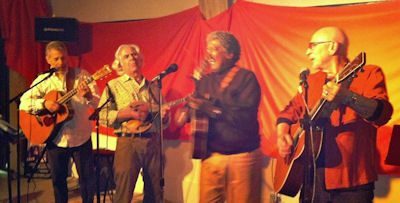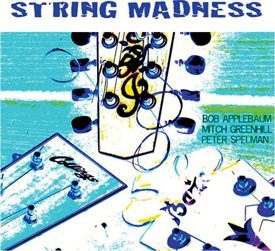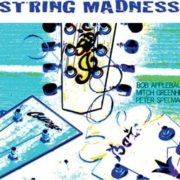STRING MADNESS LIVE AT WESTWOOD
DOC’S GUITAR? STRING MADNESS HAS IT
LIVE AT WESTWOOD MUSIC
NOVEMBER 10, 2013
 Arthur Rubenstein and a violinist were in Carnegie Hall for 16-year old Jascha Heifitz concert debut when his seatmate took out his handkerchief and wiped his brow. A few minutes later his seatmate took out another handkerchief and wiped his face of the sweat. A few minutes later he asked Rubenstein if he had an extra handkerchief. “It’s getting kind of warm in here, isn’t it?” he asked. “Not for us piano players,” replied Rubenstein.
Arthur Rubenstein and a violinist were in Carnegie Hall for 16-year old Jascha Heifitz concert debut when his seatmate took out his handkerchief and wiped his brow. A few minutes later his seatmate took out another handkerchief and wiped his face of the sweat. A few minutes later he asked Rubenstein if he had an extra handkerchief. “It’s getting kind of warm in here, isn’t it?” he asked. “Not for us piano players,” replied Rubenstein.
That’s how I felt in the backroom of Westwood Music yesterday afternoon, for String Madness debut performance at Fred Walecki’s legendary music store—you know—the one that set up Neil Young’s and Joni Mitchell’s guitars, not to mention Ry Cooder’s.
It got awful warm in there, listening to acoustic guitarists Mitch Greenhill and Peter Spelman, and mandolinist Bob Applebaum. They put on a show the likes of which you might hope to see at Carnegie Hall, not your friendly neighborhood guitar hangout.
It wasn’t just good, and it wasn’t just great; it was spectacular. If you wondered what may have happened to Doc Watson’s guitar, well Mitch Greenhill is playing it—an amazing 12-string guitar—which Doc gave to Mitch as a gift six months before he died. Mitch played at Doc’s funeral, and graciously gave his audience the same old hymn he played for Doc’s sendoff: Wayfaring Stranger. It was not Burl Ives’ Wayfaring Stranger, I might add; it was an all-instrumental version—as was their entire show.
That’s right: String Madness only opened their mouths for some charming and funny humorous asides between songs; otherwise, they let their instruments speak for them.
From “Bach to Bop,” from jazz to bluegrass, thirty one of the luckiest music fans in the Big Orange heard a symphony of six and twelve-string guitar and mandolin arrangements of both original and classic songs that expanded the boundaries of what you thought those instruments were capable of. It made my 10-Best list of concerts this year, and that was just in the first half. What made their music so beautiful, inspiring and mind-altering is that they were not only impressive on the fast pieces (of which there were many), but equally immersed and gifted in a slow, languorous waltz, which Peter Spelman composed for a friend’s daughter who loaned him her guitar during a visit in San Francisco. He called it “For Emily, in ¾ Time.” It was splendid.
During the second half these long hairs (except for Mitch) let their hair down a bit and told some riveting stories about the music they were playing. That’s when we found out that Mitch’s 12-string (he also played his vintage six-string Martin M-38) was a gift from Doc. Mitch then led the group in an original bluegrass flat-picking breakdown he wrote in memory of Doc’s son, the late great Merle Watson (named for—whom else?—Merle Travis). He called it Merle’s Ramble, in which Mitch recreated in music the feeling he had wandering throughout the entire Chapel Hill Folk Festival named for Merle—the Merle Fest—which had many hills and valleys between stages. So did Greenhill’s masterful instrumental homage to Merle and Doc. He also made plenty of room for Bob Applebaum to shine on his mandolin, which had a storied journey on its way to Westwood Music. Applebaum used to play bluegrass full time—going all the way back to Gerdes Folk City in the heyday of the Greenwich Village Folk Revival in 1961 and ’62. Well Bob Applebaum’s mandolin has expanded its horizons since then, for he is now equally adept at Jazz and Swing as at Bluegrass. So deeply involved in each song is he that he literally has to surface—much like a snorkel-diver—before he takes on the next dive. One sees him whimsically adjusting to the new time signature of the new song, his fingers almost humming on the strings of his classic Gibson, to find their groove.
 At the same time the audience heard Peter Spelman counting off the beat, and communicating with his band-mates before actually playing a note. At one point, Mitch stepped in and slowed him down, to adjust the beat by a few measures, even turning and asking the audience if someone could give him a metronome of “94,”and this on a song that Peter had written! At those memorable moments one gets a glimmer of how tight a band String Madness is, and how intensely though nonverbally they communicate one to another. Their concert was a master class in group dynamics for trios, or any other assemblage, with many of the songs from their debut CD, String Madness.
At the same time the audience heard Peter Spelman counting off the beat, and communicating with his band-mates before actually playing a note. At one point, Mitch stepped in and slowed him down, to adjust the beat by a few measures, even turning and asking the audience if someone could give him a metronome of “94,”and this on a song that Peter had written! At those memorable moments one gets a glimmer of how tight a band String Madness is, and how intensely though nonverbally they communicate one to another. Their concert was a master class in group dynamics for trios, or any other assemblage, with many of the songs from their debut CD, String Madness.
One of many highlights was Mitch Greenhill’s recreation of Django Reinhardt’s classic Nuages, which he composed during the Nazi Occupation of Paris during the late 1930s. After his wonderful spoken introduction Mitch (supported by the group) played it on his M-38, as languorously and delicately as Reinhardt could have wished for. It was simply glorious, and not only the audience but the band as well joined in the applause as the last note died away. To be able to bring an artist of Django Reinhardt’s stature alive 75 years later at a small music store in Westwood is as gratifying a tribute as any I can think of.
But String Madness wasn’t done. They reached all the way back to the Baroque to re-imagine one of Bach’s Brandenburg Concertos for guitar (and mandolin) as it might have been performed by—I kid you not—Bo Diddley! Performed in two seamless parts, one first heard Mitch Greenhill making Doc’s 12-string sound like a harpsichord, and then Bo Diddley’s signature tempo (which Buddy Holly brilliantly mimed in Not Fade Away).
Music of this quality deserves to be celebrated and supported. String Madness will be playing next weekend at another local venue—this one downtown (east of Alameda) at Art Share on November 16th. www.reverbnation.com/show/11767478 They will be joined by singer-songwriter Jack Landron, who came up in Boston during the Cambridge folk renaissance I recounted in my recent review of Tom Rush’s appearance at McCabe’s. For those who know the dramatis personae of the Folk Revival beyond Dylan, Baez, Paxton and Ochs, Jack Landron used to be known as Jackie Washington, when he recorded for Vanguard Records. He has gone back to using his birth name, which is tantamount to finding Dylan suddenly booked as Robert Zimmerman. But under either name he is a thoroughly compelling performer – at Art Share’s performance you will thus get two for the price of one, for just $15.
Mitch Greenhill also goes back to the heyday of Boston’s Folk Revival. His father was Manny Greenhill, who was Joan Baez’ manager, and founder of Folklore Productions. Manny passed away in 1996, and Mitch now runs the company, which is based in Santa Monica. Mitch oversees Joan Baez’ Vanguard Records catalog, as well as other Vanguard artists like Doc and Reverend Gary Davis. Indeed it was Mitch Greenhill who was instrumental (no pun intended) in seeing that Gary Davis’ songwriting royalties and credit were restored after Bob Dylan recorded one of his songs—Baby Let Me Follow You Down—on his first record—without any mention of Davis. Mitch is one of the unsung heroes of the Folk Revival, who has until now been more involved in supporting other artists, despite his own classic early record for Prestige Records, one of my prize possessions. Mitch Greenhill has a lot of stories to tell, and happily he is back on stage, where he belongs. See them now, folks, before they’re at Disney Concert Hall!
On November 22 from 7:00 to 10:00pm Ross will host JFK: The 50th Anniversary Concert at The Talking Stick, 1411 Lincoln Blvd, Venice, CA 90291; (310) 450-6052. With special guests poet Sherman Pearl, finger-style guitarist Jill Fenimore, storyteller Martha Stevens, song stylist Carol McArthur, folk musician Neil Hartman, blues musician Alex “Alejandro” Soschin, and Change-Links editor John Johnson. Free and open to the public. Happy Veterans’ Day.
Ross Altman has a Ph.D. in English. Before becoming a full-time folk singer he taught college English and Speech. He now sings around California for libraries, unions, schools, political groups and folk festivals. You can reach Ross at Greygoosemusic@aol.com













